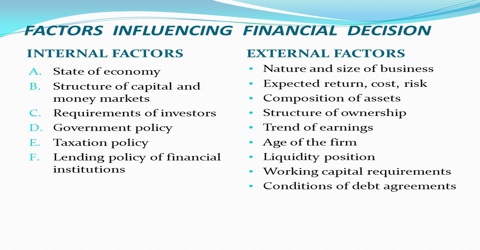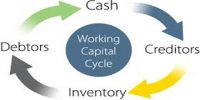Factors Affecting Financing Decision
The financing decision is concerned with the decisions about how much funds are to be raised from which long-term source, i.e. by means of shareholders’ funds or borrowed funds. Shareholders’ funds include share capital, reserves, and surplus and retained earnings, whereas, borrowed funds include debentures, long-term loans, and public deposits.
Factors influencing financial decisions are discussed in two different ways. These are- Internal Factor and External Factor. Internal Factors are- Nature of business, Size of business, Structure of business, Structure of assets, etc. External Factors are- Economical conditions, Tax policy, Government control, Capital structure, and financial market, etc.
Some of the important factors are as follows:
(a) Cost: Financing decisions are all about the allocation of funds and cost-cutting. The costs of raising funds through different sources are different. A prudent financial manager would normally opt for a source which is the cheapest. The most cost-efficient source should be selected.
(b) Risk: The risk associated with different sources is different. The finance manager compares the risk with the cost involved and prefers securities with a moderate risk factor. The larger risk is linked with the funds which are borrowed, than the equity funds. This risk assessment is one of the main aspects of financing decisions.
(c) Floatation Costs: Higher the floatation cost, less attractive the source. It refers to costs involved in the issue of securities such as broker’s commission, underwriters fees, expenses on the prospectus, etc. Higher the floatation cost of a source, the less attractive it appears to the management.
(d) Cash Flow Position of the Business: A stronger cash flow position may make debt financing more viable than funding through equity. With smooth and steady cash flow companies can easily afford borrowed fund securities but when companies have a shortage of cash flow, then they must go for owner’s fund securities only. A good or bad cash flow position gives confidence or discourages the investors to invest funds in the company.
(e) Level of Fixed Operating Costs: If a business has a high level of fixed operating costs (e.g., building rent, Insurance premium, Salaries, etc.). It must opt for lower fixed financing costs. Hence, lower debt financing is better. Similarly, if the fixed operating cost is less, more of debt financing may be preferred.
(f) Control Considerations: Issues of more equity may lead to dilution of management’s control over the business. Debt financing has no such implication. Companies afraid of a takeover bid may consequently prefer debt to equity. If existing shareholders want to retain the complete control of business then they prefer borrowed fund securities to raise further funds.
(g) Tax Rate: Since interest is a deductible expense, the cost of debt is affected by the tax rate. Since interest is a tax-deductible expense, a higher tax rate makes debt relatively cheaper and increases its attraction vise-visa equity. If the tax rate is higher, debt, financing becomes more attractive.
(h) Condition of the market: The condition of the market matter a lot for the financing decisions. During the boom period issue of equity is in majority but during a depression, a firm will have to use debt. These decisions are an important part of financing decisions.
















